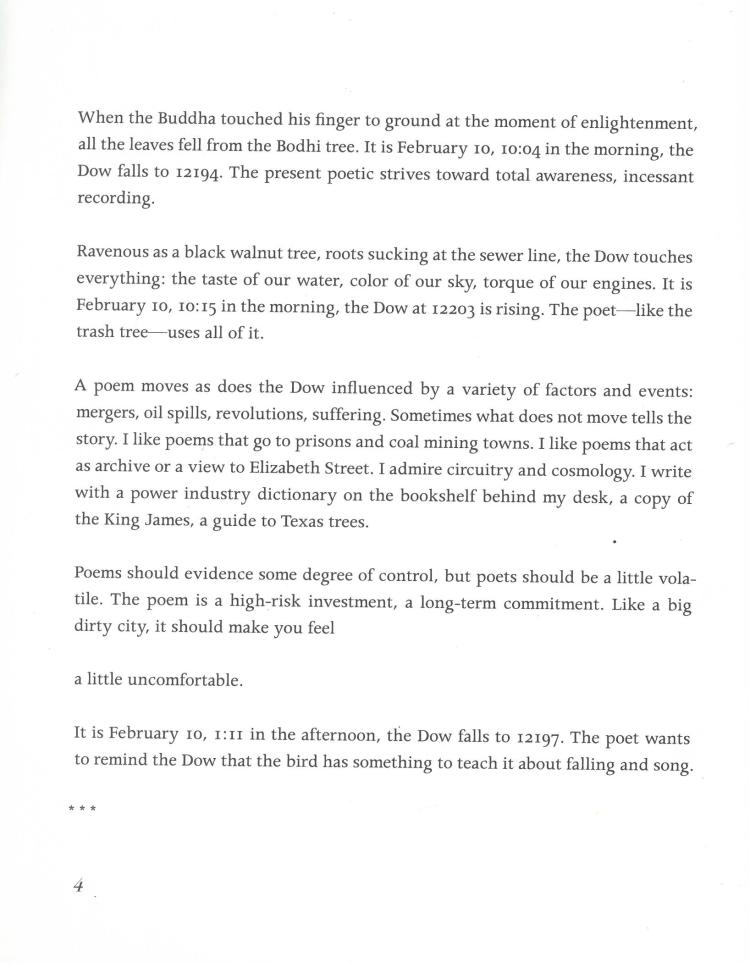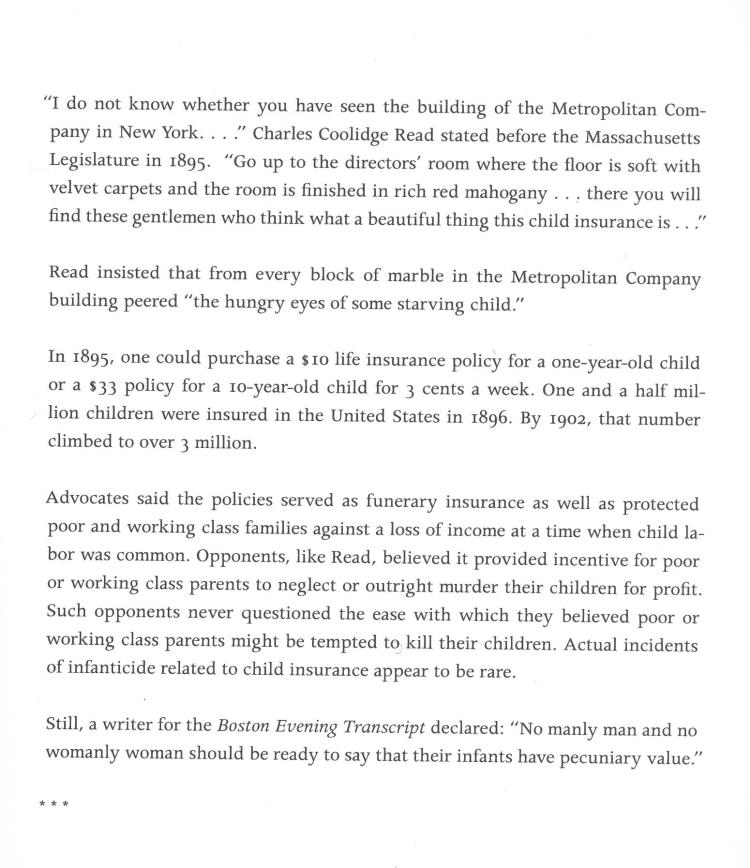Today, we have an interview with Susan Briante, conducted by the University of Colorado-Boulder's own Whitney Kerutis.
From her University of Arizona profile: Susan Briante’s most recent book The Market Wonders (Ahsahta Press) was a finalist for the National Poetry Series. The Kenyon Review calls it “masterful at every turn.” She is also the author of the poetry collections Pioneers in the Study of Motion and Utopia Minus (an Academy of American Poets Notable Book of 2011) both from Ahsahta Press. About Utopia Minus, Publisher’s Weekly declared: “this book finds an urgent language for the world in which we live.”
Let’s first talk about the book, The Market Wonders. I notice the attention in the work to the act of recording, speaking specifically of the quoted and referenced artists, the recording of the Dow, and echoes of philosophy. These records suggest a sort of mass communication within the book. What drove this need for record?
I have an undergraduate degree in journalism, and I have always had an interest in work with a documentary impulse. I love books such as CD Wright’s One Big Self or Mark Nowak’s Coal Mountain Elementary that attempt to document the lives of others. But documentary strategies can be used to examine the life of the poet, to create a kind of auto-ethnography. Brenda Coultas in “The Bowery Project” documents the transient population in her neighborhood as she reflects on her own life and the consequences of her living there. Bernadette Mayer records seemingly every thought and action in a single day in her life in Midwinter Day.
Our American economy determines value through accounting and recording. We monitor the rise and fall of certain stocks or the values of certain sectors of the economy. We base our understanding of our economic (and in many ways “national”) health on certain numbers and indices. That’s a choice. It’s not natural. The nation of Bhutan, for example, tracks Gross National Happiness instead of Gross Domestic Product. I wanted the book to highlight that obsession with accounting, documenting, and recording, as well to use my life experience as another point of data for tracking the effects of those values.

There is also a great deal of commodity/trade/measurement in this book, in some moments, examining the poet’s own work as commodity. What then, is the relationship between the poet/poetry/creativity and this sense of commodity/assigning value? Perhaps pushing this question further, the poet’s relationship or survival in a world that thrives on economics and progress? To push this question further, how does the poet survive in a world predicated on economics and progress?
Some poets want to see their art as something untarnished by certain political, economic, or social concerns. And I think it’s important to consider poetry or art in general as a refuge, a place for reimagining reality. But economics, like politics or ideology, penetrates the practice of poetry on every level. Economics determines who learns poetry in school. Economics determines who has the time to read or write poetry. I love the quote from a letter Marcia Nardi wrote to William Carlos Williams (reprinted in Anne Boyer’s Garments Against Women) “as if there were no connection between my being struck at the ribbon counter in Woolworth’s for eight hours a day at minimum wage, and my inability to function as a poet.”
On the other hand, poetry operates on the periphery of our economy in terms of the kind of money one can make by writing it. If you decide you are not going to make your living as a poet or can’t make a living as a poet, something very few people can , do, then there’s a freedom in that. I always tell my students that in the face of an economy that puts so little value on poetry, the act of writing the poem (or making art of any kind) is an act of resistance towards those values.
I notice a great intermingling between the individual experience of loss and the fluctuation of the Dow’s fluctuation in the market place. Where does the language allow the individual to exist in such a work that concerns itself with exploring global ideas and i/issues? How does the speaker identify their own loss in these monetary practices?
The individual feels the effects of economic structures and systems around them, “the web in which [people], suffering, find themselves...” as Muriel Rukeyser would call it. Many of the most interesting writers today, from the critic Laurent Berlant to Claudia Rankine, demonstrate the importance of lived experience as a tool with which to measure economic precarity or systemic racism.
The autobiographical information in The Market Wonders acts as another kind of data in addition to the raw numbers of the market. In this lyric investigation of the economic system, it provides information that could only be gleaned from lived experience. Still, it’s not the only thing going on in the book. It is not the only experience one could have under this economic system, nor a universal experience. It needs to be understood in context of larger market forces and other potential experiences. And the book, especially in the final long poem “Mother is Marxist,” tries to point to other experiences of the market.

I’d like to shift now to you as the poet. I’m curious how you, as a professor who teaches other poets, evaluates student poetry, reviews her peers, and is married to another poet, how you keep an intimate relationship with your own work when it becomes so embedded in other areas of your life. Is there a practice you do for your self as an artist personal, artistic practice that keeps your relationship to the artistry of poetry pure, individual, and renewed?
I actually benefit from the connections between what I teach and what I am writing. I try to use what’s around me it. In some essay or interview, Eileen Myles talks about writing in New York and when someone called or came over—those interactions and conversations just became part of the poem. Alice Notley says at the end of one my favorite poems (“1992”): “..it’s walking/in a wet Parisian dark that’s/utilizable, every inch..” Of course, the rest of life, only feels “utilizable,” if one gives attention to the writing. Putting the time in with the poetry is what keeps renews it.
The last question I have for you concerns the future of poetry. As we see in your work, there is more and more angreater influence of the technological, monetary-driven world in our subject matter when we sit down to write. How does an art like poetry survive in such a changing world? Is there an obligation or call-to-poets to engage more directly with this new-agetoday’s world?
On one hand, there are more means and media one can use to “publish” the poem than ever before. There are amazing digital lyric pieces. For example, I love the video poems of Kate Greenstreet and Claudia Rankine/John Lucas. But I also think the book itself is a technology with a long, strong history. And poems will continue to be made with new technologies and old.
I am excited about technological opportunities and challenges. Poetry survives by responding to that ever-changing world. Poetry survives (even thrives) when it demonstrates the courage to respond to that world as it is now, reveals additional information about what persists through time, and finds ways to continually imagine what else could be both on and beyond the page.
